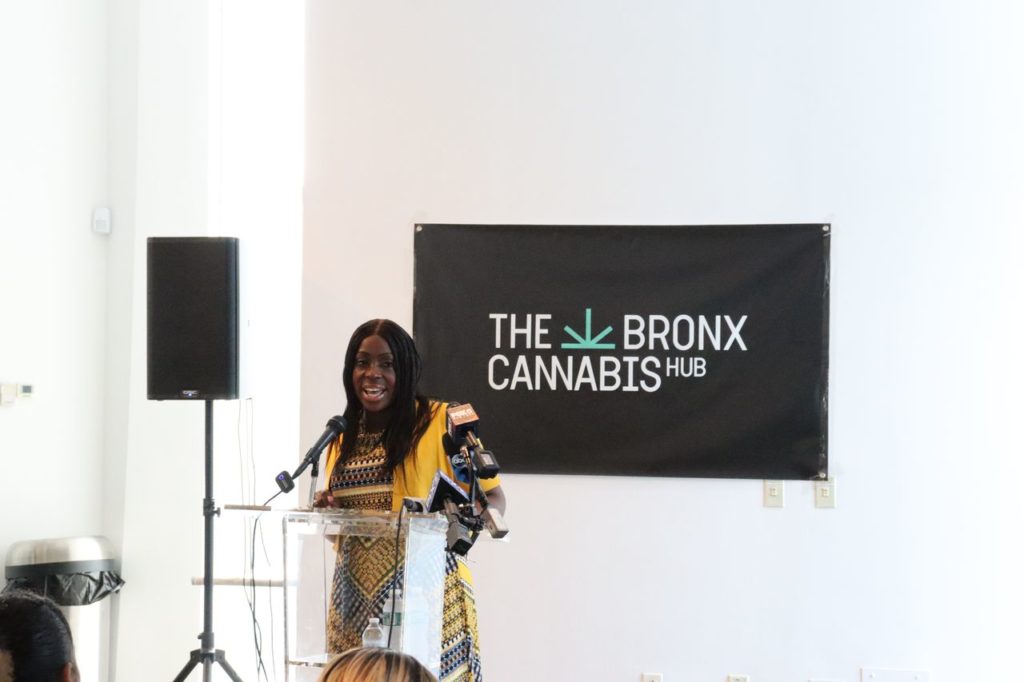Bronx Borough President Vanessa Gibson speaks during the launch of The Bronx Cannabis Hub on July 24, 2022.
The Bronx Cannabis Hub, an offshoot of nonprofit public defender group The Bronx Defenders, is taking the social justice-minded mission of its parent organization and applying it in New York’s fledgling cannabis industry.
The Hub, which is operated in partnership with The Bronx Community Foundation, was launched in July with a mission of supporting communities harmed by marijuana prohibition – helping disadvantaged New Yorkers navigate the application and licensing process for cannabis businesses and offering support to those who can’t afford the $2,000 application fee.
Bronx Cannabis Hub Director Patrice Edwards said the hub is intended to be “a trustworthy resource, and support for those who’ve been most harmed by the War on Drugs and over-criminalization of marijuana to be able to receive pro bono legal support and to submit license applications.”
Eli Northrup, the Bronx Cannabis Hub’s interim director from its founding through December, has been intimately involved with the Hub from its genesis. While it’s been publicly active for less than a year, it’s been an idea in development since New York State’s cannabis legalization law, the Marihuana Regulation and Taxation Act, was passed in March 2021.
Since long before the Hub started, justice in cannabis policy has been hugely important to Northrup over his near-decade as a public defender, he said.
“One of the number one charges that I saw was marijuana possession,” he said. “It was a huge amount of arrests every single year. And so, I could see from my perspective, just in that role, how much it affected people, and how disproportionate it was … on racial lines.”
Around the passage of the MRTA, he realized there was a massive need for legal support for people from underserved communities trying to get into the cannabis space.
“It became clear that there weren’t free, legitimate legal services out there for individuals who wanted this,” Northrup said. “So, I started talking to people at Bronx Defenders saying, ‘hey, is this something maybe we could step into?’ Because what we have is a history of working on this issue.
“We have trust in the community, we have clients who have been directly affected by the marijuana laws. And we have outstanding relationships with pro bono law firms based on our previous work.”
That’s how the Hub began, Northrup said.
“We can act as a hub, a convener, and ensure that people aren’t taken advantage of, and try to ensure that the social equity provisions of the law play out, because social equity has not worked in other states. It just – it hasn’t,” Northrup said.
The social equity provisions Northrup is referring to are the portions of the MRTA that require the state Cannabis Control Board to implement an equity plan to promote applicants from communities that have been “disproportionately” impacted by cannabis prohibition, and create an incubator program for those applicants.
The MRTA is unique among state-level cannabis legalization laws in that it established a goal of awarding 50% of adult-use cannabis licenses to those equity applicants – the very same applicants The Bronx Cannabis Hub was created to assist.
“I think there’s a real responsibility for New York, because in my mind, New York has the best law in the country in terms of prioritizing social equity,” Northrup said. “There are people at the Office of Cannabis Management who I believe actually care about getting it right. And so, if New York can’t do it, it’s very hard to imagine that it’d be done in another state, right? If New York can do it, then it can be a model, when other states legalize, when it’s legalized federally.”
In the months prior to the Hub’s launch, the primary task was finding funding, Northrup said. That work continues, but the Hub is now in a position to give out the help it set out to provide.
“Our number one priority right now is ensuring that our current CAURD cohort, which is 30 (applicants), has everything that they need as the licenses continue to roll out,” said Edwards, the Hub’s director.
That means, she said, “ensuring that they have their core pro bono legal service support, as well as being connected to wraparound services, that relate to them being able to successfully be approved for their application, and then ensuring that we have all of our processes in place, and we’re ready to go when OCM releases those applications.”
Edwards, who started officially in her new role on Dec. 5, 2022, described the Hub as an exciting work in progress.
“It feels as if we are flying a plane while we’re also building it,” she said. “It’s a very common phrase used in politics and nonprofit management, but that is exactly what it’s been like for me in this position. And not in a bad way. I think this is a very exciting time for New York City. This is a very exciting time for the Bronx in particular.”
Building not just that plane, but advocating for why more planes are needed, is another goal of the Hub moving forward, she said.
“The Hub is also very much invested in having a say in the larger conversation, and making sure that we continue the conversation around why the Hub matters, why this work needs to be replicated across the city, why this needs to be replicated across states that are choosing to legalize, and why this is a worthy model to continue to invest in,” Edwards said.
“I would say, in a nutshell, that is what the next two years looks like: really just building out our framework of support, and continuing to be anchored in providing our pro bono legal services.”
If you purchase a product or register for an account through one of the links on our site, we may receive compensation.



